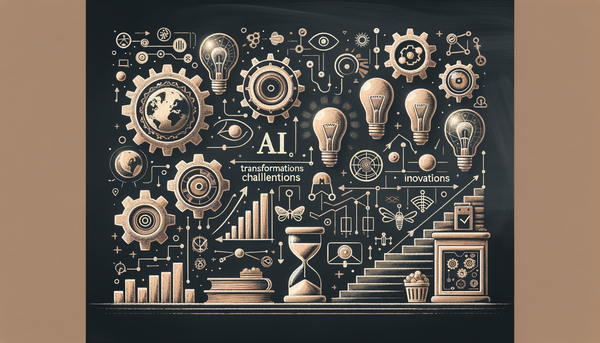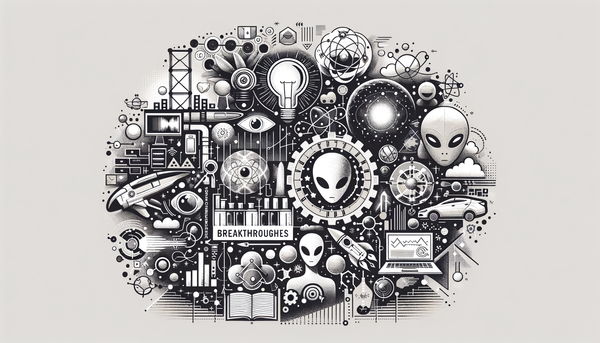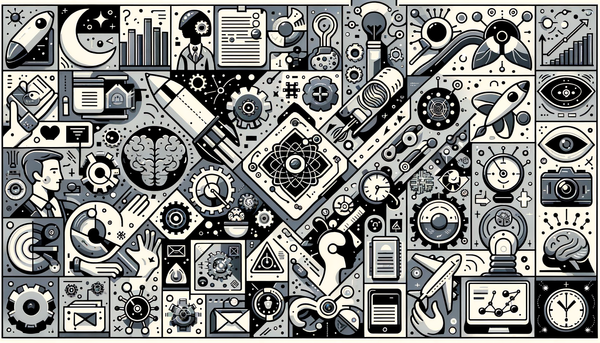AI News Podcast Episode Highlights
From Nvidia’s ambitious ventures into "embodied intelligence" and biotechnology innovations to an AI-first transformation of IT infrastructures and controversial meme-fueled digital discourse, the latest AI highlights reveal a multifaceted technological evolution that is reshaping industries, governance, and even cultural narratives across society.
Embodied Intelligence in the Real World
Nvidia’s recent breakthroughs are more than just theoretical musings—they represent a bold step towards integrating artificial intelligence directly into tangible, everyday applications. At a high-profile tech conference in Singapore, Nvidia showcased an impressive suite of over 70 research papers, illustrating their drive to imbue AI with practical, embodied intelligence. This approach intends for AI systems not only to understand text and imagery but to actively operate in domains like manufacturing, biotech, and transportation.
A standout in their arsenal is the Skill Reuse via Skill Adaptation (SRSA) system that empowers robotic agents to adapt learned skills to novel tasks. With reported improvements like a 19% increase in task success, these types of innovations are paving the way for smarter automation in logistics and manufacturing. Meanwhile, in biotechnology, Nvidia’s Proteína model has taken on the enormous challenge of synthesizing complex protein structures at a scale that even rivals existing benchmarks—shedding light on potential accelerations in vaccine development and enzyme design.
Nvidia further demonstrated the utility of real-time mapping with their STORM initiative, crafting 3D reconstructions in less than 200 milliseconds. This kind of speed is essential for a wide range of applications, including drones, augmented reality systems, and autonomous navigation. Reflecting on these advances, it's not hard to recall John McCarthy’s timeless words,
“Artificial intelligence is the science of making machines do things that would require intelligence if done by men.”
These innovations underscore a paradigm shift: AI is moving beyond abstract algorithms and into practical environments where adaptability and speed are key. For a deeper dive into similar cutting-edge advancements, feel free to check out the latest discussion on AI innovations and trends at AI.Biz.
Rebuilding IT Infrastructure for an AI-First World
The rapid evolution of AI-centric applications has compelled organizations to reimagine their IT frameworks entirely. In today’s digital landscape, traditional, rigid IT systems are giving way to more agile, cloud-based, and integrated infrastructures. CIO insights reveal a fundamental need for companies to rethink and rebuild their IT stacks, aligning them with the demands of an AI-first world.
Companies are increasingly investing in advanced data management systems that offer real-time analytics and predictive insights. The integration of cloud computing services, particularly platforms like Microsoft Azure, is proving crucial for scalable and cost-effective operations. This shift is complemented by robust cybersecurity measures that leverage AI for real-time threat detection, safeguarding sensitive data even as applications grow in sophistication.
For instance, Johnson Controls has embarked on a bold digital transformation under CDIO Vijay Sankaran. Their journey towards an agile, cloud-native IT ecosystem reflects a broader industry trend where the success of technology initiatives is dependent on harmonized collaboration between in-house teams, vendors, and cloud providers. Such strategic overhauls are not just about technical upgrades but also about creating an organizational culture that encourages innovation and anticipates future challenges.
This transformation is detailed further in platforms like AI innovations challenges, where companies explore how strategies like a centralized AI team and automated troubleshooting tools are driving productivity and efficiency in real-world settings.
Humor, Politics, and the Digital Blurring of Boundaries
The interplay between AI, humor, and political expression presents a fascinating case study in how technology is reshaping traditional modes of communication and public discourse. Memes and AI-generated images have taken center stage in political narratives, as seen in recent controversies involving former President Donald Trump.
One instance featured an AI-generated image of Trump dressed as a Pope—a provocative display that combined political satire with digital art. This image provoked strong reactions from Catholic communities and media outlets alike, sparking discussions about the appropriateness of using AI to remix sacred symbolism. Similarly, a separate meme featured Trump wielding a red lightsaber to evoke Star Wars imagery, highlighting a modern crusade in the battleground of digital politics, where humor and controversy are both powerful tools for influencing public opinion.
What these incidents reveal is a blurred line between jest and respect in political communication. The use of AI to generate such content shows that while technological innovation enables creative expression, it also calls for a sensitive consideration of cultural and religious sentiments. As pundits and experts examine these developments, it becomes clear that digital humor is both a blessing and a potential pitfall in shaping informed, respectful public discourse.
For discussions that mix technology with political commentary, the evolving digital narrative is echoed in the detailed updates found in our intriguing updates on AI and society section at AI.Biz.
AI in the Courtroom: Ethics, Impact, and New Modalities of Justice
In an unprecedented moment in legal history, the use of AI technology to craft a victim impact statement has not only redefined courtroom procedures but also ignited conversations on the ethical boundaries of AI in judicial settings. In Chandler, Arizona, the family of a deceased Army veteran leveraged advanced AI to recreate the presence of their loved one, allowing his voice to resonate during sentencing. This creative use of technology offered closure and comfort in an emotionally charged environment.
The recreated impact statement mixed warmth and humor, as the victim playfully noted, "Remember, getting old is a gift that not everybody has, so embrace it." Such an instance suggests that AI can be a powerful tool in bridging the traditional with the modern, offering both efficiency and a deeply personal touch in situations of loss and healing. However, this pioneering use also raises critical questions about the integrity and ethical use of AI within the justice system—questions that are now under careful regulatory consideration.
Legal experts and civic leaders are actively debating the implications of introducing AI-generated content in courtrooms, a development that could have far-reaching effects on how justice is delivered and experienced. The inherent challenge lies in balancing technological potential with the imperative to honor the memory and dignity of those involved in sensitive legal matters.
Additional insights on the innovative applications of AI across different sectors, including its role in upholding justice, are available in our coverage on AI innovations and challenges at AI.Biz.
AI, Surveillance, and the Evolving Debate on Privacy
The power of AI reaches far beyond industrial applications or courtroom enhancements. One of the most potent and contentious arenas in which AI has made its mark is surveillance. Recent revelations indicate that the U.S. government is using increasingly sophisticated AI-driven systems to monitor social media activities. By harnessing advanced algorithms and data analytics, government agencies can now sift through vast amounts of digital data, tracking interactions in real time.
While proponents argue that such monitoring can help counter misinformation and bolster public safety, critics sound a stark warning: the erosion of privacy rights. The deployment of targeted surveillance measures has led to concerns that these tools could be misused, deliberately narrowing the scope of civil liberties and placing even ordinary citizens under an unprecedented level of scrutiny.
This melding of AI with surveillance technology encapsulates the ongoing debate between efficiency and ethics. As society grapples with the dual promises and perils of rapid digital transformation, it becomes increasingly apparent that the quest for security should not come at the expense of fundamental privacy rights. The discussion is complex, eliciting passionate opinions from digital rights groups, policymakers, and ordinary netizens alike.
This evolution reminds us of Fei-Fei Li’s optimistic perspective:
"I imagine a world in which AI is going to make us work more productively, live longer, and have cleaner energy."
Yet, it also forces us to reconsider whether the benefits of such advancements may inadvertently imperil the openness of our digital lives.
Marketing, Media, and the Allure of Authenticity in an AI Era
Beyond the realms of high-stakes politics and legal battles, AI has even sparked creative campaigns in the world of marketing. Del Real Foods, for example, recently launched its "Abuela Intelligence" initiative—a charming campaign that pits the warmth of traditional wisdom against the cool efficiency of modern AI. Featuring spirited grandmothers offering authentic advice in both English and Spanish, the campaign celebrates the irreplaceable value of human connection in a consumer-driven market dominated by digital automation.
This creative campaign is not only a marketing success story but also a thoughtful commentary on the importance of authenticity in a world where AI solutions, however advanced, sometimes lack the personal touch. As brands venture into digital transformations, those that successfully blend technology with charm and sincerity often resonate best with their audiences. Del Real Foods' decision to foreground the timeless wisdom of "abuela" proves that human values can stand out even amid technological revolutions.
In an era where online content and memes often blur the lines between humor and controversy, initiatives like Abuela Intelligence remind us that technology must ultimately serve human needs. The warm nostalgia evoked by the campaign provides a counterbalance to the sometimes cold, algorithm-driven messages proliferating online. It is a striking illustration of how embracing tradition can be as innovative as the latest digital disruption.
Looking Forward: Dialogues, Regulation, and the Future of AI
The rapid pace of AI development has spurred candid conversations among industry leaders, policymakers, and cultural commentators. At the 2025 Reframe Festival, journalist Kara Swisher engaged in a thought-provoking dialogue, discussing not only the current applications of AI but also its future trajectory amid ethical dilemmas and regulatory challenges. Much was said about influential figures like Elon Musk, whose unconventional approaches continue to stir both admiration and scrutiny.
This dialogue underscored an essential truth: while AI holds enormous transformative potential, its integration into society must be guided by thorough oversight and responsible governance. Developing appropriate regulatory frameworks that balance innovation with ethical safeguards is a priority for both private and public sectors. As the conversation around AI deepens, there is an increasing recognition that open, proactive discourse is critical to ensuring that technology enhances societal well-being rather than compromising it.
Another notable development in shaping the future of AI comes from industry giants like IBM. Although details of their recent announcement hint at more aggressive U.S. investments in the AI market, the implication is clear—a transformative era is upon us. These strategic moves are signaling an impending convergence of technology, policy, and market forces that may soon redefine the competitive landscape globally.
For those keen to stay abreast of the latest industry shifts, the continuous updates at AI.Biz provide an excellent resource—as reflected in our updates on emerging innovations and strategic pivots within the AI domain.
A Final Reflection on the AI Revolution
Today’s technological landscape is a rich tapestry woven with threads of innovation and ethical debate, practical application and imaginative storytelling. As industry giants like Nvidia transform abstract code into tools for real-world change, and as policymaking and marketing explore new ways to engage with society, it becomes evident that AI is no longer a distant technological frontier—it is an everyday reality.
The recurring theme across these diverse stories from AI.Biz is both the immense potential of AI to revolutionize disparate sectors and the growing need for delicate, informed stewardship of these technologies. Whether it is in enhancing manufacturing efficiency, reconstructing IT infrastructures, sparking controversial digital memes, or even softening the blow of loss in a courtroom, AI is rapidly infiltrating every facet of life.
This intricate balance between opportunity and responsibility reminds us of the enduring human element behind every technological breakthrough. In our fast-evolving digital era, it’s crucial to remember that behind each algorithm, there are countless human stories, challenges, and triumphs that shape our collective future.
Ultimately, as we witness a revolution where machines and men work side by side, one of the most striking truths emerges: technology’s true power lies in its ability to augment, not replace, the vibrant human spirit. Perhaps the best takeaway is to stay curious and engaged, always questioning and learning, as we collectively shape an AI-driven future that respects tradition while boldly embracing innovation.




